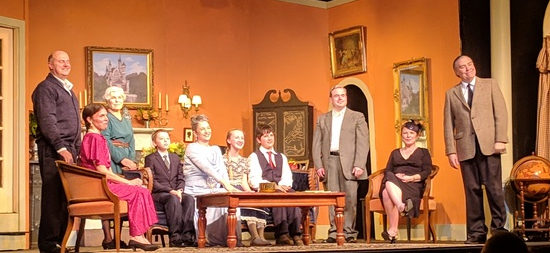
The cast of “Watch on the Rhine” by Lillian Hellman at Church Hill Theatre – Photo by Jane Jewell
Lillian Hellman’s Watch on the Rhine, currently playing at Church Hill Theatre, is a political drama with a comic edge set in 1940, when World War II was just gathering momentum in Europe but before America became directly involved. Directed by Mary James, it is at the same time an effective historical drama and a prescient look at today’s world.
Hellman, who had already made a mark with the stage and film success of The Little Foxes, wrote Watch on the Rhine in 1940, and it opened on Broadway in April 1941 – just ten months before the Japanese attack on Pearl Harbor that brought the USA into the war. The play ran for 378 performances, winning the New York Drama Critics’ Circle award as best play. In 1942, she went to Washington for a special birthday performance for President Franklin D. Roosevelt, whom she met and spoke to about the need to oppose Hitler – a main theme of the play.
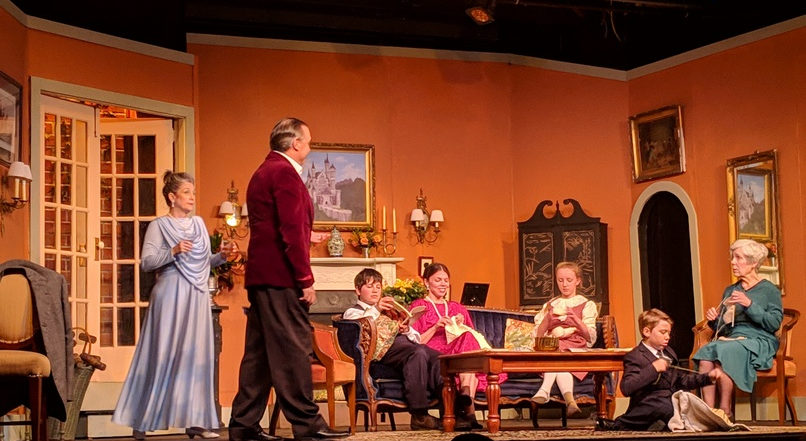
L-R Jane Copple as Fanny Farrelly, Will Robinson as Count Teck De Brancovis, Lisa Wojehowski as Joshua Muller, Darlene Greer as Sara Muller, Calla McClusky as Babette Muller, Connor Christopher as Bodo Muller, and Sheila Austrian as Anise in “Watch on the Rhine” by Lillian Hellman at Church Hill Theatre – Photo by Jane Jewell
The next year, the play was adapted for Hollywood by Dashiell Hammett, Hellman’s life-long romantic partner. The film version starred Bette Davis and Paul Lukas, who along with George Coulouris reprised their roles in the Broadway production. Jack Warner of Warner Brothers studios paid $150,000 for the rights to the play, reportedly because he felt it would boost patriotic feeling now that the U.S. was in the war. Davis and Lukas also took part in a radio broadcast of the play in 1944.
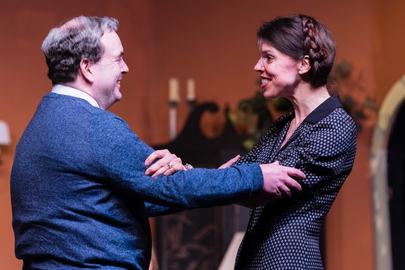
David and Sara, brother and sister reunited in “Watch on the Rhine” by Lillian Hellman at Church Hill Theatre – Photo by Steve Atkinson
The play takes place in an elegant residence in the Washington suburbs, where socialite Fanny Farrelly and her son David, a lawyer, are awaiting the arrival of Fanny’s daughter Sara and her family. At first, it seems that the play is about classic family struggles, childhood tensions that have evolved into strained relations between parents and adult children, Slowly it becomes clear that there is much more going on. The play touches on several serious themes –how marriages rarely turn out to be what the happy couples expect, what war does to people, how it changes them, the compromises they make just to get by and stay alive, how even children are involved and must grow up quickly.
Fanny has been semi-estranged from her daughter whom she hasn’t seen or spoken to in twenty years, though there have been occasional letters. Fanny is excited about Sara’s return from Europe although it quickly becomes clear that she is also the type of mother who controls everything – planning and controlling everyone’s lives down to the last detail, although in a humorous and gracious way.
Sara’s husband Kurt Muller is an engineer of German birth, who has spent much of his life fighting against the rise of fascism. The Mullers are accompanied by their three children, Joshua, Babette, and Bodo. Also staying at the Farrellys’ home are a Romanian aristocrat, Count Teck de Brancovis, and his wife Marthe, who was a childhood friend of Sara’s. Also present is Anise, the family’s long-time maid.
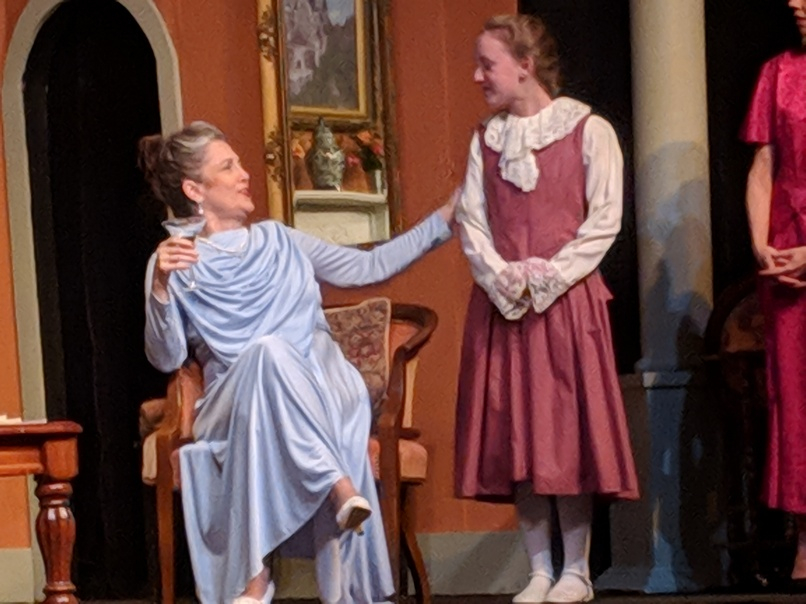
Fanny (Jane Copple) meets her granddaughter Babette (Calla McCluskey) in “Watch on the Rhine” by Lillian Hellman at Church Hill Theatre – Photo by Jane Jewell
Almost from the moment of the Mullers’ arrival, the Count is curious about Kurt’s origins, his occupation, everything about him. It’s immediately evident he has some agenda for asking all the questions, which Kurt generally evades. Our suspicions of the Count increases as we learn he has been playing high-stakes poker – despite being apparently short of funds himself – with a group of German diplomats in Washington. It becomes clear that Kurt has escaped Europe because the Nazis are looking for him, and that he continues to work against them even in America.
Fanny is oblivious to all this, talking about the gossip in her social circle and treating Sara like a child. As Sara re-bonds with her old friend Marthe, she learns that life with the Count is nothing like what Marte expected when they married. Meanwhile, it becomes clear that the Count not only has fascist sympathies but that he is ready to use whatever he learns from or about Kurt to his own advantage. And that inevitably leads to trouble. And a surprising climax to the play.
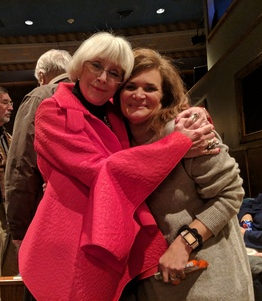
Director Mary James and set designer Temple Worth for “Watch on the Rhine” by Lillian Hellman at Church Hill Theatre – Photo by Jane Jewell
Mary James, who has extensive directing credits with the St. Martin’s Community Theater and the Colonial Players in Annapolis, makes her CHT directing debut with this production. She has assembled a strong cast – a tricky proposition given how close to the holiday season the performance was scheduled – and the resulting play is well worth their efforts.
Jane Copple, a veteran of many performances at CHT and other regional theaters, takes the role of Fanny Farrelly, the mother. She is in her element in this role, lording it over a household where far more than what her character understands is going on. Copple does a nice job of making the character sympathetic, showing both her “lady of the manor” side and her genuine concern for her daughter and grandchildren who, in her opinion, have been irresponsibly traipsing around an increasingly dangerous Europe. Copple, who has an excellent singing voice, is more frequently seen in musicals. It’s nice to see her in a straight dramatic role.
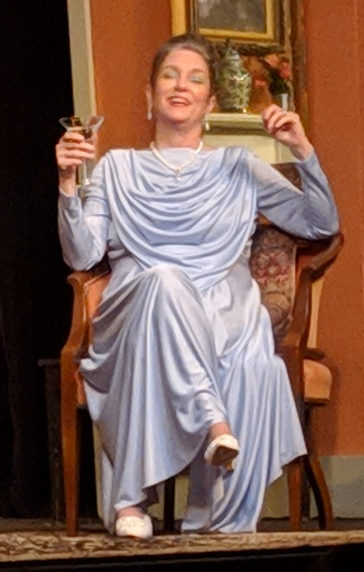
Jane Copple as Fanny Farrelly in “Watch on the Rhine” by Lillian Hellman at Church Hill Theatre – Photo by Jane Jewell
Howard Messick, another regular on the local theater circuit, is cast as David Farrelly, and he does a fine job with the character – a bit of a mama’s boy who shows some real strength when called on to respond to a crisis. He treats his mother with both deference and a bit of eye-rolling.
Bob McGrory plays Kurt Muller, the anti-fascist refugee. He deploys a convincing accent – possibly as a result of spending time in Germany in his younger days – and gives the character a good balance between the sympathetic family man and the tough freedom fighter.
Will Robinson plays the villain, Count De Brancovis, with an effective blend of menace and aristocratic disdain. Robinson is quite tall and makes good use of his height and physical presence to tower over and physically intimidate other characters, especially his wife and the other men in the house, all while playing the amiable guest. Robinson is frequently cast in comic roles, and it’s good to see him stretching beyond his normal range.
Genevieve Croker does a good job with the role of Marte, the Count’s long-suffering wife. Marte has come to realize that she is stuck in a dead-end marriage that is not going to get any better. She has struck up a friendship with David that is slowly moving from long talks and shared confidences to a budding romance. A nice job.
Darlene Greer plays Sara Muller, the daughter returning home to a mother who doesn’t quite understand the life her grown-up daughter has chosen. Sara is happy to be back home again, especially to see her brother David who she was always very close to. But she is also determined not to let her mother take over her life again. In many ways, Sara’s experience of trying to raise a family in war-torn Europe has made her a much more realistic and mature person than her wealthy socialite mother. Greer brings just the right amount of practicality, warmth and a surprising resilience to her character.
Sheila Austrian is well cast as Anise, the maid, who seems to be somewhere between a valued family friend and a servant, speaking her mind sometimes and meekly following orders other times. It’s a hard line to walk and Austrian does it very well. Anise immediately starts taking care of the grandchildren and is delighted to see Sara again, who she helped to raise from babyhood.
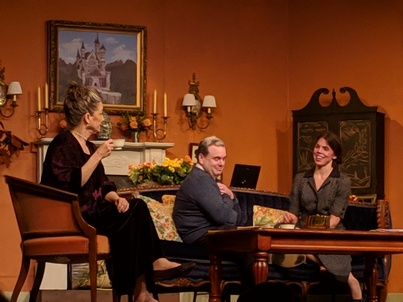
Family reunion- Fanny, David, and Sara in “Watch on the Rhine” by Lillian Hellman at Church Hill Theatre – Photo by Jane Jewell
Lisa Wojehowski, Connor Christopher and Calla McCloskey play the three Muller children, Joshua, Bodo, and Babette. All three do an excellent job and create separate personalities for their characters. Babette twirls around in her pretty dress but she is also mature for her age. Bodo is a bit of a scholar and is always dropping pearls of knowledge into the conversation. Special kudos go to Lisa Wojehowski who convincingly takes on the role of Joshua, the oldest son, who has had to take on responsibilities beyond his young age.
The play is structured in three acts, with an intermission after the first. It ran just under two hours on opening night. At first, it feels very much like a drawing-room comedy, with Fanny’s social pretensions and dithering about picking up her daughter’s family at the station. But the political plotline, which to my ears had a very contemporary ring despite its origins in the 1940s, soon brings a more serious focus to the proceedings. Hellman’s handling of the theme hits home by her linking of the fight against fascism to the lives of believable flesh-and-blood characters, who at one point assert that surely America would not reject refugees from war and violence. As it happened, America in the 1930s and ’40s did both, taking in many refugees but also denying many others, turning away entire boatloads of European refugees from World War II. The play clearly shows how history moves in its eternal cycles, surprising each generation as the same things happen again, just a little bit differently.
The set, designed by Temple Worth from a concept by James, is marvelous – as we have come to expect from Church Hill Theatre. The costumes are also outstanding – especially Copple’s elegant dresses – thanks to Tina Johnson and Debra Ebersole. The performance was also solid; perhaps the only weakness was that a couple of the characters’ voices sometimes failed to carry to the back of the auditorium. Sit up close if you want to follow all the dialogue.
Watch on the Rhine runs through February 3, with performances at 8 p.m. Fridays and Saturdays and Sunday matinees at 2 p.m. Tickets are $20 for general admission; CHT members get a $5 discount, and student tickets are $10. Call the theater at 410-556-6003 or visit the theater website for reservations.
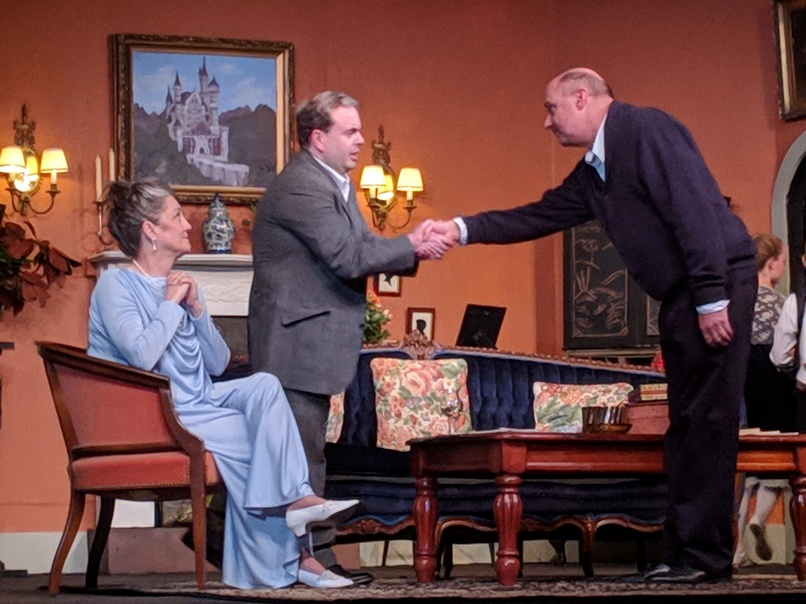
Fanny Farrelly and her son David Farrelly greet son-in-law Kurt Muller whom they have not seen for 20 years. – “Watch on the Rhine” by Lillian Hellman at Church Hill Theatre – Photo by Jane Jewell
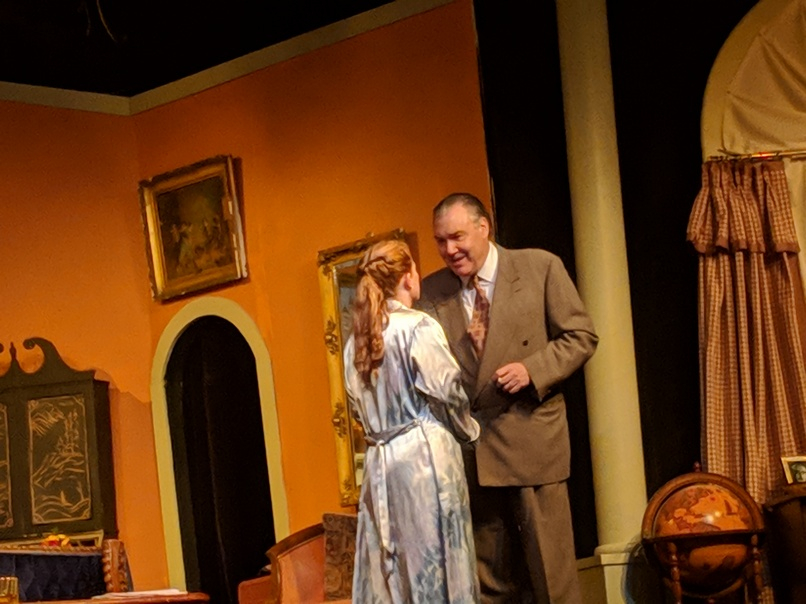
The Count De Brancovis (Will Robinson) confronts his wife Marte (Genevieve Croker) in “Watch on the Rhine” by Lillian Hellman at Church Hill Theatre – Photo by Jane Jewell
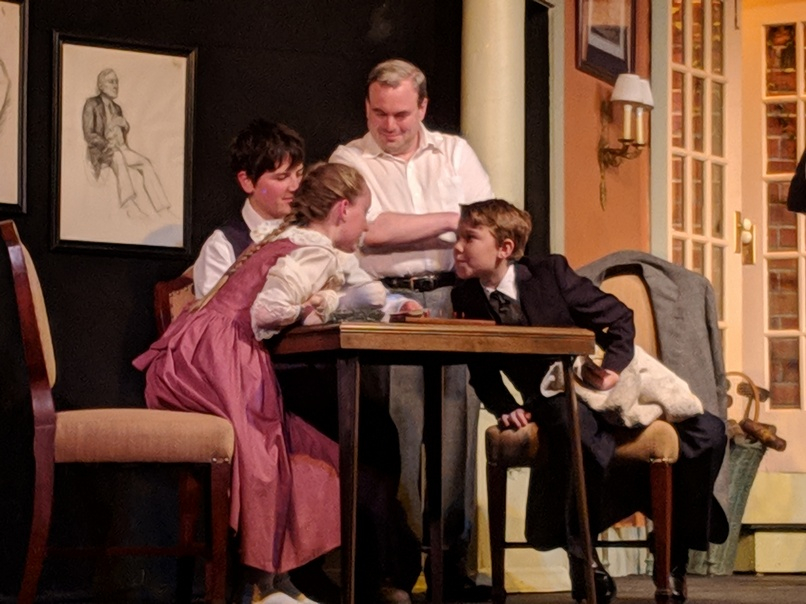
David Farrelly (Howard Mesick) with Babette (Calla McClusky), Joshua, (Lisa Wojehowski), and Bodo (Connor Christopher) in “Watch on the Rhine” by Lillian Hellman at Church Hill Theatre – Photo by Jane Jewell
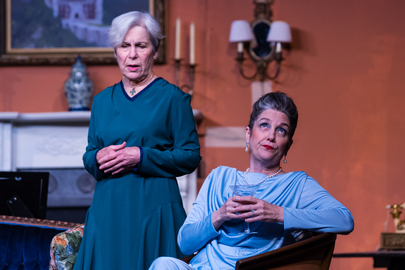
Anise knows her lady Fanny well – “Watch on the Rhine” by Lillian Hellman at Church Hill Theatre – Photo by Steve Atkinson
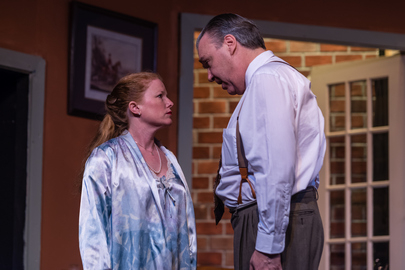
Marte and Teck in “Watch on the Rhine” by Lillian Hellman at Church Hill Theatre – Photo by Steve Atkinson
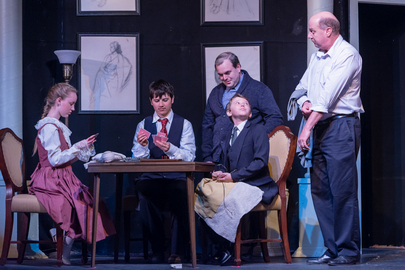
Babette, Joshua, David, Bodo, and Kurt in “Watch on the Rhine” by Lillian Hellman at Church Hill Theatre – Photo by Steve Atkinson
###



Mary James says
Wonderful review, and much appreciated. The only glitch is the photo of the two ladies. One is indeed Mary James in red, but the other is Temple Worth who did the set. Is there any way of changing that on line?
Peter Heck says
Thanks, Mary. Caption changed to correctly identify Temple Worth. And thanks for a great show. Jane And I really enjoyed it.